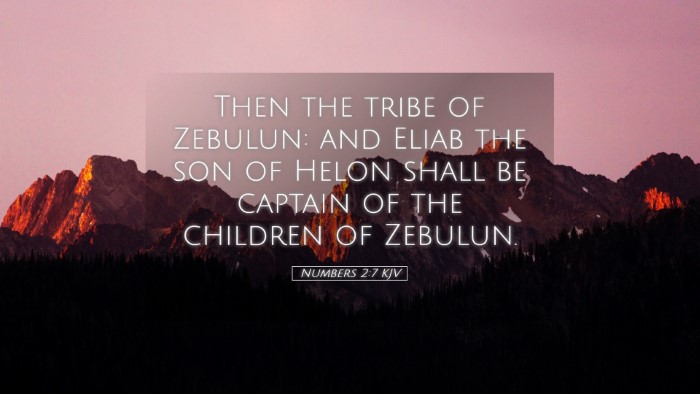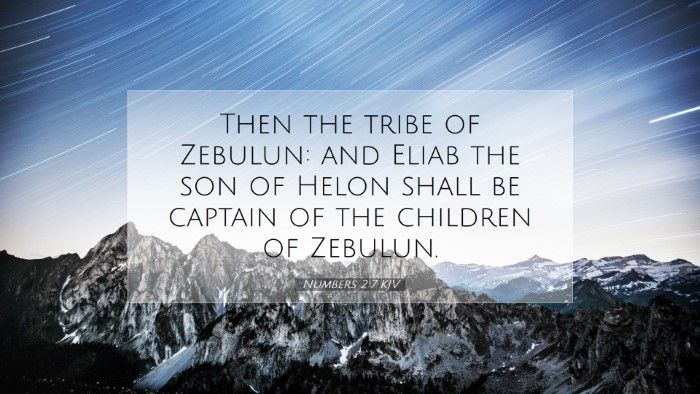Commentary on Numbers 2:7
Numbers 2:7 states: "Then the tribe of Issachar, the leader of the people of Issachar, was Nethanel the son of Zuar." This verse is part of the enumeration of the tribes of Israel as they were organized in their encampment around the Tabernacle. The significance of this arrangement and the roles of the leaders are critical for understanding the community dynamics in Israel during the Exodus.
Overview of the Context
This chapter falls within the book of Numbers, which primarily focuses on the arrangements of the Israelites during their journey in the wilderness. The meticulous organization of the tribes symbolizes order amidst the chaos of their nomadic existence. The positions of each tribe around the Sanctuary highlight God's centrality in their lives.
Insights from Matthew Henry
Matthew Henry notes that the mention of Nethanel, the son of Zuar, depicts God's specific appointments in leadership. Henry emphasizes that the selection of leaders is not arbitrary but divinely orchestrated. Nethanel’s role symbolizes not just leadership but also a representation of God’s provision for His people.
- Leadership: The importance of godly leaders is apparent; Nethanel’s position reflects the trust placed in him by the Lord and the people.
- Symbolism of Tribes: Each tribe’s allotment and station signify their purpose and responsibility within the larger framework of God's plan.
- Order and Structure: Henry argues that God’s people should reflect order in their community life as a witness to the chaotic world around them.
Insights from Albert Barnes
Albert Barnes offers a detailed perspective on the tribe of Issachar’s placement and its implications. He reiterates that Issachar, as the fifth son of Jacob, embodies certain characteristics evident in the behavior and fate of his descendants throughout biblical history.
- Characteristics of Issachar: Barnes reflects on how the tribe was noted for its knowledge of the times and ability to discern what Israel ought to do (1 Chronicles 12:32). This insight into their character suggests that leadership in the community was also about wisdom.
- Role in the Community: The emphasis on leadership extends beyond mere position; it speaks to the moral and spiritual guidance expected from such leaders.
- Appointed Roles: Barnes points to the significance of names in biblical narratives, suggesting that Nethanel’s name, meaning "gift of God," underscores that leadership is ultimately a divine gift.
Insights from Adam Clarke
Adam Clarke provides an analytical view of the tribe's organization, focusing on the historical context of Issachar's descendants. He suggests that the tribe of Issachar is representative of industriousness and faithfulness, attributes that manifest in their activities and contributions to the nation of Israel during significant events.
- Historical Reflection: Clarke ties Issachar's challenges and achievements back to their early ancestors, suggesting that Nethanel’s leadership can be viewed as a culmination of their collective history.
- Attributes of Issachar: Clarke highlights that the tribe's inclusion and representation signify not only their past but also the expectations for the future as God’s chosen people.
- Unity and Calling: Clarke emphasizes that the tribes, despite individual identities, functioned together under the call of God, illustrating a unified approach essential for fulfilling their covenant responsibilities.
Theological Implications
The mention of Nethanel as the leader of Issachar carries several theological implications for contemporary readers:
- Divine Order: Each name and position is ordained by God, reminding believers of the importance of recognizing God's sovereignty in leadership and community structure.
- Spiritual Leadership: The characteristics of the leaders set forth a model for spiritual leadership qualities that are desirable, including wisdom, discernment, and reliance on God’s guidance.
- Community Identity: The tribal organization serves as a metaphor for the broader Christian community, illustrating the importance of unity, purpose, and shared identity under one God.
Conclusion
Numbers 2:7 illustrates more than just a name in a genealogical record; it represents the principles of leadership, community, and divine orchestration amidst God's chosen people. The insights from public domain commentaries enrich our understanding of this verse and invite deeper reflection on the significance of godly leadership today. For pastors, students, and theologians, it serves as a powerful reminder of the importance of structures within God’s plan and the vital role that individuals play in fulfilling His purposes on earth.


